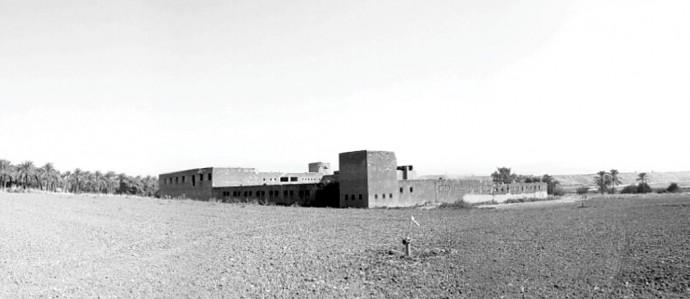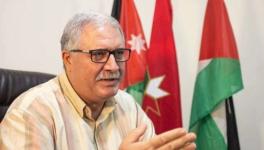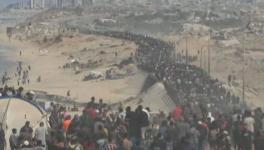Other Futures are Always Possible: Tegart’s Long Shadow over Palestine

A Tegart Fort in Palestine (Image courtesy: http://quaderns.coac.net/en/2015/03/tegart-forts/)
Imagine for a moment that you are not able to use future tense in speech. You will not be able to plan a vacation, consider your children’s education, or for that matter, think actively about retirement. Your life will be restricted to an immediate and unending present, where you will not be permitted to premeditate anything more than the next round of grocery-shopping. That too if the grocery-store continues to stand when you visit it again. Now imagine the uncertainty of this existence compounded by a constant fear of death — of yourself, your friends and family, your neighbours and countrymen. Imagine this death to be the only certain aspect of your life for the next several months and you will not be able to imagine anything anymore.
Try thinking of running away without knowing where to hide. Nowhere is safe. All this while the cordon closes in on you. If you have ever played combat video game simulations like PUBG, imagine similar scenarios unfolding in real life. Only here you are unarmed, not interested in killing anyone, and do not remember ever having consented to be a part of any of this. You grow tired, but you can only run. After a point, that is no longer an option. This is the predicament of almost every Palestinian in Gaza today. Over thirty thousand of them reportedly killed, and over a million — more than half the population in that cramped open-air prison — are on the move, running for their lives. The Israeli strategy since 1948 has been simple: to make future impossible for Palestinians.
To ensure that, their present — the here and now — is being made unbearable using techniques of surveillance and infrastructure of repression that were carried upstream by intra-imperial flows of information and expertise in the first half of the twentieth century. Palestine was a victim of the empire and its agents on ground then. It continues to be so now. In 1936, Palestine was a League of Nations mandate administered by Britain. In effect, it was a British colony in all but name.
A royal commission headed by Lord Peel was sent to inquire into the causes of unrest in that mandatory territory following a six-month long general strike by the Arabs. By the time its report was published in 1937, recommending the partition of Palestine through the creation of a separate Jewish state, the Arabs had revolted. Not confident of how the police would handle the situation, the British administration sent for a colonial insurgency expert. It brought the Derry-born Irishman by the name of Charles Tegart out of retirement to ‘reform’ the police force in Palestine. In this task, he was assisted by the former head of the Intelligence Bureau in colonial India, David Petrie.
Tegart had served for over three decades in the Indian Police Service since 1901. For the longest part of his tenure, he was associated with the Calcutta Police, barring brief stints in the Western Front during the First World War in 1916, and in Ireland in the aftermath of the war of independence in 1921. Gaining quite the reputation as a notorious adversary among Bengali nationalist and militant circles, Tegart was instrumental in establishing the dreaded Special Branch of the Calcutta Police. He rose through the ranks and retired as the Commissioner after eight years in office in 1931. The very next year, while serving as a member in the Secretary of State’s Council for India, he delivered an influential lecture at the Royal Empire Society in London titled ‘Terrorism in India’. He drew on his experiences as a police officer in the colony to paint the revolutionary terrorist organizations of Bengal as “based on perverted religion and an equally perverted patriotism”.
Tegart belonged to that cohort of late-Victorian imperialists who subscribed to the institutionalized belief that ‘criminality’ was inherited, contagious, and an inescapable feature of the Orient. For him, it was axiomatic to regard terrorism as the extreme manifestation of a fanatical hive-mind — best suppressed by presuming guilt and meting out collective punishment, whether preventive or retributive.
He had transformed the Calcutta Police from a purely civil force that operated out of run-down rented premises to one that boasted mobile columns perpetually concerned not just about ‘law and order’ but ‘security’ in general. Consequently, Tegart’s reputation as a builder of repressive institutions and robust networks of intelligence-gathering preceded him. In Calcutta, he had successfully lobbied for the overwhelming expansion of urban police infrastructure. Within a decade of his helmsmanship, the police force acquired enough real estate to both exponentially extend its personnel strength and detention capacity. Similar things were expected of him during his deputation in Palestine, with the pro-empire press touting him as “an implacable and imperturbable enemy of anarchical terrorists”. His actions went even further.
Tegart and Petrie likened the situation in Palestine to that in Punjab and Bengal. They recommended that the Palestine Police be transformed into a ‘security force’ comprising a frontier force, a rural mounted force, and a police strike force operating from the headquarters. They also inaugurated the most ambitious security project thitherto undertaken anywhere in the British Empire: the construction of a security fence along the Palestine and Syria-Lebanon border and the erection of a network of 77 fortified police posts called ‘Tegart forts’ (or simply ‘Taggarts’) throughout the territory of the mandate.
This project purportedly cost upwards of £3.5 million back in the day, resulting in the construction of 66 bombardment-proof and self-contained concrete enclosures over a period of three years. Tegart also drew on his experience of intelligence-gathering in Calcutta to establish what came to be known as ‘Arab Investigation Centres’. In these horror houses, torture was weaponized to extract confessions and tip-offs from anyone suspected to be an insurgent. The repertoire of interrogation strategies employed here would bear haunting resemblance to the ones adopted to ‘dilute’ Mau Mau rebels in 1950s Kenya.
Several Tegart forts are active even today, most of them being used by Israel as police stations, prisons and IDF bases. One of them in the Palestinian village of Karkur (now in the Haifa district) reportedly houses Camp 1391, a high-security detention facility for ‘high-risk’ Palestinian prisoners. The insignia of the Israel Border Police, charged with the patrolling of the infamous checkpoints, boasts the depiction of a Tegart Fort — symbolizing authority, preparedness, and state-sanctioned terror. Once relics of British imperial presence in the region, these structures — now militarized and repurposed — signal Israel’s intent to double down on conquest and relentless occupation: of Palestinian lives and land.
During his stint in Palestine, Tegart strongly advocated the segregation of Palestinian villages into ‘good’ and ‘bad’ settlements and demanded powers for levying collective fines and punishments to discourage civilians from supporting the insurgents. Arab civilians’ complicity in the revolt, either by withholding information from the police or by extending material support to the rebels, was regarded as a truism in official circles. So much so that the 1937 Defence Order in Council permitted the destruction of homes and property suspected to be used as bases by the insurgents. This was yet another outcome of Tegart applying counter-insurgency ‘common sense’ gleaned from British ‘pacification’ campaigns in the North-West Frontier Province and incendiary bombings in Iraq to Palestine. These methods would soon be exported to every corner of the empire: in Aden and Malaya, in Kenya and Sind.
In indiscriminately targeting Palestinian civilian infrastructure and victimizing Palestinians for their very existence in Gaza today, Benjamin Netanyahu is following in the footsteps of Charles Tegart. By acting as the retainer devoted to upholding US strategic interests in the Middle East, Israel is continuing a long tradition of imperial repression in that region. It proclaims itself as a democracy but continues to rely on British imperial infrastructure and techniques to make future impossible for Palestine and Palestinians.
The Zionist project needs to wage a perpetual war to justify itself. In doing so, it kills civilians. It kills children. It makes life hell for a group of people for the crime of being born. It refuses to let them grow old. The world watches in horror and abomination, perhaps with pity and anger too. Yet, most fail to connect the dots. History did not begin on the 7th of October, 2023. Old imperial poison is being sold in new bottles with a ferocity that knows no bounds. Holding Israel accountable is holding the British Empire accountable. It is to hold every settler-colonial regime ever accountable. It is to call for a solidarity between people from colonies past and present. It is to remind people that even when history rhymes violently and ‘the earth closes on them’, memory remains. And so long as it does, other futures are always possible.
The views expressed are personal.
Get the latest reports & analysis with people's perspective on Protests, movements & deep analytical videos, discussions of the current affairs in your Telegram app. Subscribe to NewsClick's Telegram channel & get Real-Time updates on stories, as they get published on our website.
























